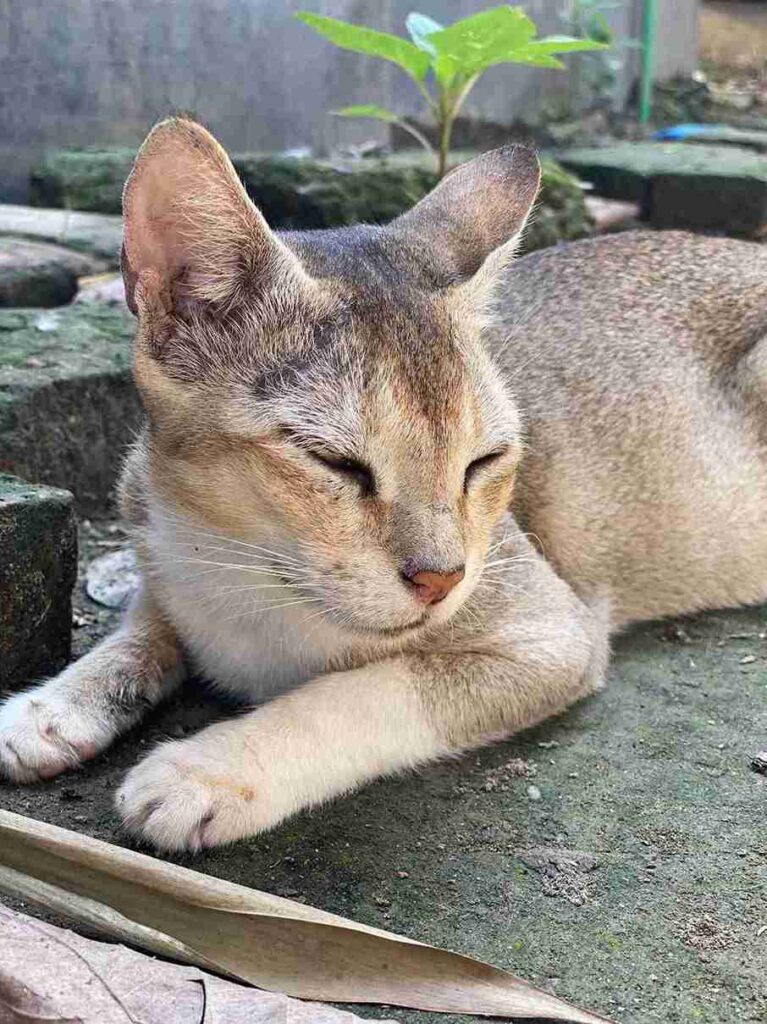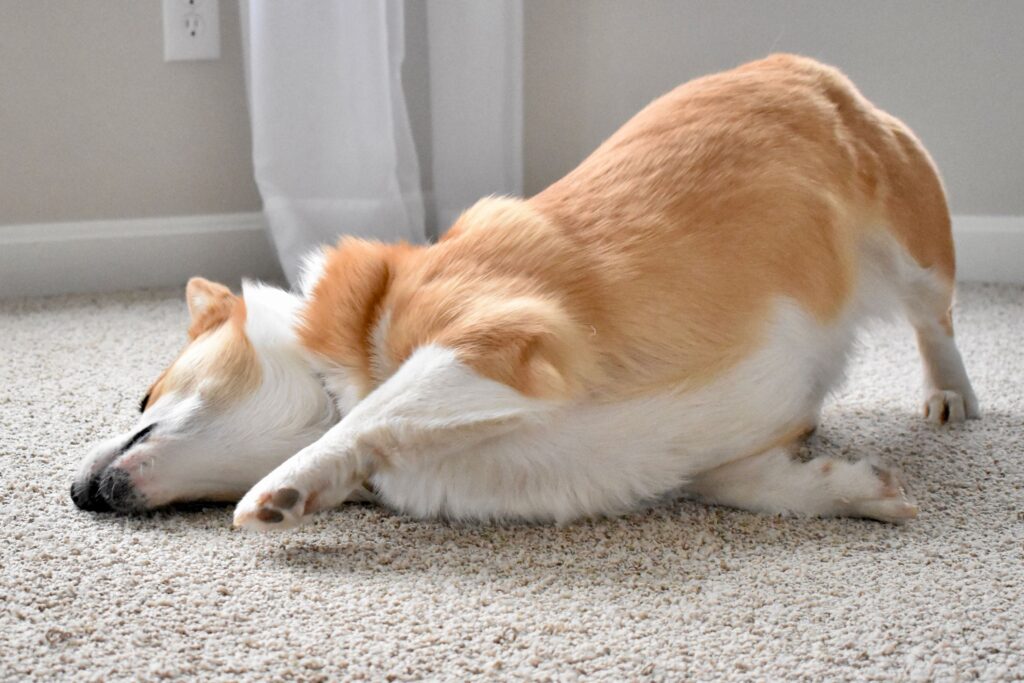If your cat is walking low to the ground and crouching, it may indicate feelings of fear, stress, or an underlying health issue. It’s important to observe other behavioral changes and consult a veterinarian for a proper diagnosis and treatment, if necessary.
Understanding the reasons behind your cat’s crouching behavior can help provide the necessary support and care for their well-being. Cats are known for their agility and graceful movement, so it can be concerning when you notice your feline friend walking low to the ground and crouching.
This behavior can indicate a variety of issues that may need further attention. We will explore the possible reasons why cats crouch and walk close the ground. By understanding the possible causes and underlying problems, you will be able to provide the appropriate care and support for your feline companion’s well-being. If you notice this peculiar behavior in your cat, it’s essential to observe any other behavioral changes and consult a veterinarian for a proper diagnosis and treatment, if necessary.
Contents
- 1 The Significance Of Cat Body Language
- 2 Recognizing The Signs Of A Cat Walking Low To The Ground
- 3 Physical Health Issues
- 4 Emotional Or Behavioral Factors
- 5 Seeking Veterinary Advice
- 6 Creating A Safe And Comfortable Environment
- 7 Promoting Confidence And Security In A Cat
- 8 Frequently Asked Questions On My Cat Is Walking Low To The Ground: Why Is She Crouching?
- 9 Conclusion
The Significance Of Cat Body Language
Observing a cat’s body language can provide important insights into their behavior and emotions. One common behavior that cat owners may notice is when their cat walks low to the ground or crouches. This body position often indicates that the cat is feeling cautious, threatened, or ready to pounce.
When a cat walks low to the ground, it is a natural instinct for them to try and blend into their surroundings, making themselves appear smaller and less noticeable. This behavior is often seen when a cat is stalking prey or getting ready to defend itself.
Owners should pay close attention to their cat when it starts crouching, as it may be a sign of being in an uncomfortable or stressful situation. It is important to provide a safe and calm environment for the cat to alleviate any potential stressors.
By being aware of a cat’s body language and understanding the significance of their behavior, owners can better communicate and respond to their cat’s needs, ultimately fostering a stronger bond between the two.
Recognizing The Signs Of A Cat Walking Low To The Ground
Recognizing the signs of a cat walking low to the ground can indicate various reasons for this crouching behavior. It may be a sign of fear, pain, or an instinctual response to stalk prey.
Body Posture And Position
Cats have a unique ability to communicate through body language. When a cat is walking low to the ground, it is often a sign of a defensive or fearful posture. Their body may appear compact, with the head held low, and the back legs slightly crouched. This posture allows them to feel more secure and ready to pounce or escape if necessary.
Tail Position And Movement
The position and movement of the tail can also provide insights into a cat’s emotional state. A cat walking low to the ground may have their tail tucked between their legs or held close to their body. A twitching tail can indicate agitation or anxiety, while a puffed-up tail is a sign of aggression.
Facial Expressions
Cats often communicate through their facial expressions. A cat walking low to the ground may have dilated pupils, flattened ears, or a tense facial expression. These are all indicators of heightened alertness and wariness.
Physical Health Issues
Cats can crouch low to the ground due to potential injuries or illnesses that cause pain or discomfort. It’s important to monitor your cat’s behavior and look out for any signs of distress. If your cat is walking low to the ground and seems unusually hesitant or slow, it may be an indication of an underlying issue.
Some common injuries or illnesses that can cause your cat to crouch include musculoskeletal problems, such as sprains or fractures. Cats may also crouch if they have digestive issues or urinary tract problems that cause discomfort.
If you notice your cat crouching for an extended period of time or if they exhibit other worrying symptoms like loss of appetite or changes in litter box habits, it’s essential to consult a veterinarian. They can perform a thorough examination and determine the cause of your cat’s unusual behavior, providing the appropriate treatment and care.
Emotional Or Behavioral Factors
Fear or Stress: If your cat is walking low to the ground, it could be due to fear or stress. Cats are known to crouch and adopt a defensive posture when they feel threatened or scared. This could be caused by a new environment, loud noises, or unfamiliar people or animals. Make sure to create a safe and secure space for your cat, providing hiding spots and reducing any potential triggers that may cause fear or stress.
Anxiety or Insecurity: Cats that feel anxious or insecure may also crouch or walk low to the ground. This could be caused by changes in their routine or environment, separation anxiety, or a lack of socialization. To help alleviate anxiety in your cat, provide a consistent routine, plenty of positive reinforcement, and create a calm and peaceful environment. Consider consulting with a veterinarian or a professional behaviorist for additional support and guidance.
Past traumatic experiences: Cats that have had past traumatic experiences may exhibit crouching behavior as a way to protect themselves. These experiences could include abuse, neglect, or abandonment. Patience, understanding, and consistent positive reinforcement can help your cat gain trust and confidence. It is important to create a loving and secure environment, offering plenty of hiding spots and avoiding situations that may trigger fear or anxiety.
Seeking Veterinary Advice
It is important to seek professional evaluation for potential health issues when you observe your cat walking low to the ground or crouching. Cats may exhibit this behavior for various reasons, and a veterinary examination can help identify the underlying cause. During the evaluation, the veterinarian will assess your cat’s overall health, conduct a physical examination, and potentially perform diagnostic tests if necessary. They will look for signs of pain or discomfort, as well as any abnormalities in gait or posture. This examination can help determine if your cat is experiencing issues such as musculoskeletal problems, pain, digestive disturbances, or even behavioral issues.
By consulting a veterinarian, you can ensure that any potential health problems are addressed promptly and appropriately. Early intervention can prevent further complications and discomfort for your feline companion. If you notice your cat crouching or walking low to the ground, reach out to your veterinarian to schedule an appointment and provide your cat with the necessary medical attention.

Credit: www.vetstreet.com
Creating A Safe And Comfortable Environment
In order to address why your cat is walking low to the ground or crouching, it is important to create a safe and comfortable environment for them. Providing hiding spots and safe spaces is crucial to help your cat feel secure. Cats often exhibit this behavior when they are feeling stressed or anxious, so by giving them designated hiding areas, such as cat trees, shelves, or even cardboard boxes, you can give them a sense of safety and control.
Minimizing potential stressors is also important in helping your cat feel more at ease. This can include reducing loud noises, limiting visitors, and maintaining a consistent daily routine. Calming pheromone sprays or diffusers can also help create a more relaxing environment.
Remember, each cat is unique and may have their own individual preferences and needs. By creating a safe and comfortable environment, you can help address your cat’s crouching behavior and ensure they feel secure in their surroundings.
Promoting Confidence And Security In A Cat
Promoting confidence and security in a cat is essential for their well-being. One effective way to achieve this is through positive reinforcement training techniques. By using this approach, you can build trust and create a strong bond with your feline friend. Encouraging good behavior with rewards and praise helps your cat feel secure and confident in their environment. Patience is key when implementing these techniques, as cats may take some time to adjust and understand what is expected of them. By offering treats, toys, and affection, you can reinforce positive behaviors and discourage negative ones. It is important to note that punishment-based training methods can be detrimental to a cat’s confidence and may lead to fear and anxiety. By using positive reinforcement, you can help your cat feel comfortable and develop a sense of self-assurance.
Frequently Asked Questions On My Cat Is Walking Low To The Ground: Why Is She Crouching?
What Does It Mean When A Cat Walks Crouched Down?
When a cat walks crouched down, it typically means they are cautious or trying to be inconspicuous. It could be due to fear, pain, or simply a hunting instinct.
Why Is My Female Cat Crouching?
Female cats crouch for various reasons. It could be a sign of discomfort, preparing to pounce or giving birth. If your cat is in pain, unable to walk or showing other worrying signs, consult a vet. It’s important to monitor her behavior and seek professional help if necessary.
Why Is My Cat Crouching More Than Usual?
Your cat may be crouching more due to various reasons like pain, fear, or discomfort. It is essential to observe changes in behavior and consult a veterinarian for a proper diagnosis and treatment.
Why Is My Cat Walking Low And Hiding?
Your cat may be walking low and hiding because it is feeling scared or anxious. It might be experiencing stress or discomfort, so it seeks safety in hiding spots. Observe for any signs of illness or changes in the environment that could be causing this behavior.
Conclusion
Understanding why your cat is crouching low to the ground is crucial for their health and well-being. It could be due to fear, pain, illness, or even a natural instinct. By observing their behavior and seeking veterinary advice if necessary, you can help ensure your feline friend stays happy and healthy.
Remember, a cat’s body language can provide valuable insights into their needs.
Katie Lindsey is a passionate cat lover and founder of Cats Solution, a comprehensive resource for all things feline. With a lifelong love for cats and extensive knowledge in their care and behavior, she provides expert advice and solutions to cat owners. Through her website, Katie fosters a supportive community where cat enthusiasts can find guidance and heartwarming stories. A dedicated advocate for animal welfare, Katie also promotes responsible pet ownership and adoption. Join her on this purr-fect journey celebrating the joy of feline companionship.



